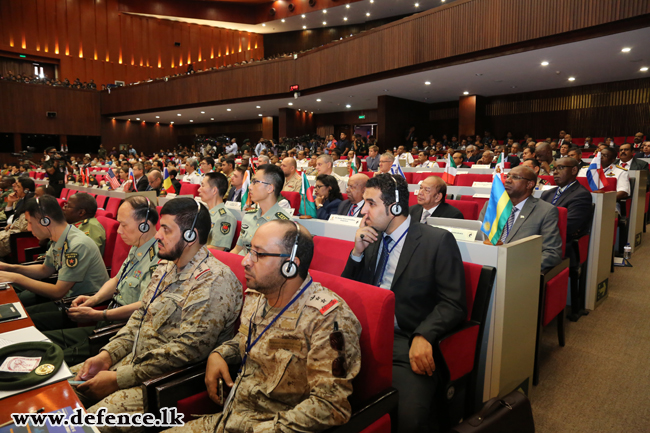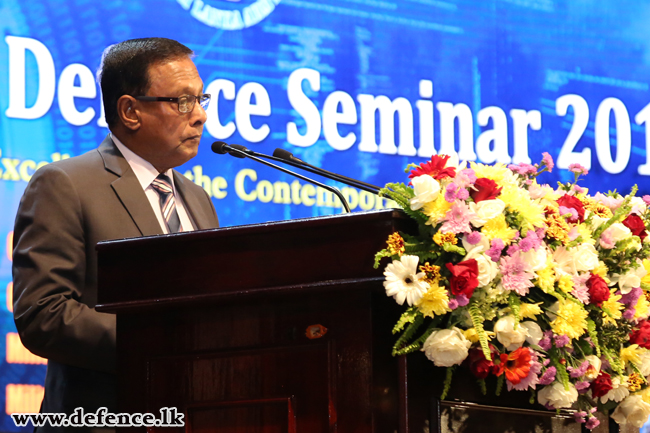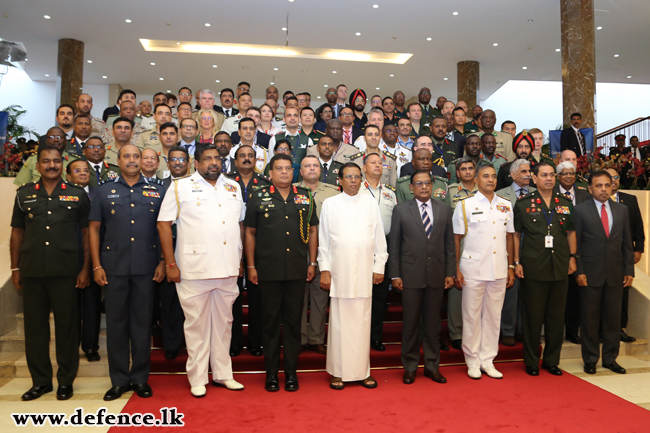Secretary Defence makes Opening Remarks at the “Colombo Defence Seminar – 2019”
August 29, 2019The 9th “Colombo Defence Seminar – 2019” commenced at the Bandaranaike Memorial International Conference Hall in Colombo, today (29th August 2019). President Maithripala Sirisena graced the opening session as the Chief Guest, held this morning.
Secretary to the Ministry of Defence General SHS Kottegoda WWV RWP RSP VSV USP ndc was also present at the occasion.
The President was received by the Commander of the Army Lieutenant General Shavendra Silva upon his arrival at the BMICH.
Organized by the Sri Lanka Army under the auspices of the Ministry of Defence, the Colombo Defence Seminar is the flagship international conference of the Army. This year will be the 09th in the series of this annual international conference.
This year the conference is being held under the theme “Evolving Military Excellence in the Contemporary Security Landscape”. A large participation of both local and international participants are attending the conclave, this year.
Making the Opening Remarks the Secretary Defence said, this Seminar is being held in backdrop of a worldwide discussion as to how best the militaries of developing nations can be transformed and modernized to take up emerging challenges, from conventional and an alarming variety of non-state actors. The discussion in this forum shall reflect a clear consensus of interdependencies between military modernization, resources constraints and sustainable development goals of participating nation states.
The full text of the Secretary's speech is as follows,
“I would like to thank the Commander of the Army for inviting me to make the opening remarks at this august assembly and I believe Sri Lanka’s contribution to global peace and stability has been reassured and revalidated by facilitating this high level international forum for the 9th consecutive year to discuss transforming global issues and common security concerns under the theme “Evolving Military Excellence in the Contemporary security landscape”.
At the very outset, whilst welcoming all foreign and local dignitaries and participants to our beautiful island and to the Defence seminar 2019, I wish to commend and appreciate the effort taken by the Commander of the Army and his dedicated team of officers and men in arranging this valuable platform.
We hold this seminar in the backdrop of a worldwide discussion as to how best the militaries of developing nations can be transformed and modernized to take up the emerging challenges, from conventional and an alarming variety of non-state actors. The discussion in this forum shall reflect a clear consensus of interdependencies between military modernization, resources constraints and sustainable development goals of participating nation states. However, our understanding and commitment on an integrated approach towards achieving prosperity through lasting peace, security and stability, notwithstanding the constraints and development agendas, would have a greater chance for success in dawning a world free form interferences in the future.
Ladies and Gentlemen, counter terrorism has become one of the hot topics in the global agenda today than ever before. The peace loving world is being constantly and continuously troubled by a wide range of terrorist threats, from organized terrorist organizations with global reach to self-motivated individual fighters.
In my belief, a joint strategy is much more workable than individual efforts in combatting terrorism as most of the threats we face today are emerging from beyond our territorial limits and jurisdictions. Such joint strategies should be with outward focus to address capacity building projects in areas such as gender equity, youth engagement, education and skill development, as a means to prevent and counter violent extremism conducive to terrorism.
Over the past years, the number and the magnitude of terrorist attacks, and the escalating count of victims and their geographical scale have increased rapidly, and terrorism has become an unprecedented threat to international peace, security and development. Terrorism aggravates perception of insecurity and can lead to repeated outbreaks of violence, which hinder sustained economic growth. By exploiting development challenges such as inequalities, poverty and poor governance, terrorism further aggravates these grievances and creates a vicious cycle of decline, which affects marginalized groups in particular. No country is immune to this threat, nor can countries resolve this problem single handedly. Better cooperation among the states to monitor and halt terrorists travel and eliminate safe havens is needed.
The traditional concerns of security have also changed with globalization. So called "nontraditional" security issues such as unregulated migration, human trafficking, drug running, intellectual property theft have become major transnational concerns.
Economic security is more than ever linked not just to the national security of the state, but also the much broader regional security. Legal frameworks on countering transnational organized crimes must be enhanced if we are to end impunity and effectively address the nexus between terrorism and organized crimes.
Recruitment and exploitation of children by the terrorists is a serious issue, which needs to be addressed through specific responses upholding the rights of children, and addressing them primarily as victims of terrorism, rather than perpetrators. Victims of terrorism can play an important role in the prevention and building of social resilience by staging their stories and disreputable impacts of terrorism.
All nation states need to work collaboratively to address terrorist threats in cyber space, particularly, terrorist recruitment, incitement and the spread of hate and violent extremist propaganda through the use of modern information and communication technologies. Developing countries thus need special assistance and support in upgrading their digital technology knowhow to keep pace with and counter its accelerating and increasing sophisticate use by terrorists.
It is vital to strengthen counter terrorism collaborations through enhanced regional and inter regional counter terrorisms frameworks, strategies, action plans and harmonized legislations to facilitate mutual legal assistance and cooperation.
Given the continuing lack of internationally agreed definition of terrorism, political will at the highest level is urgently called for, to preserve and expand common grounds to tackle the problem of terrorism and violent extremism conducive to terrorism.
Other global issues such as natural disasters, climate changes, population rise, urbanization, mass migrations, law and order issues, governance and transparency related issues, border based conflict and nuclear proliferations etc., are also rising against the peaceful and harmonized existence of the world. Absence of dedicated, trained and ready entities to deal with some of the above mentioned non-military related issues are continuously demanding the engagement of military forces, particularly in the developing nations. National authorities and military decision makers should be mindful of the full spectrum of their engagements when planning for modernizations of the forces. With the passage of time, in line with the future developments in the communication and transportation networks, individual countries that will be capable of extending timely and effective professional cross border assistance on demand may opt for specializations in some of the related fields.
Sri Lanka being an Island Nation in the Indian Ocean is highly concerned about the security situation in the Indian Ocean Region and Sea Lines of Communication.
The Indian Ocean contains very vital sea routes that connects the East and West, which have become the life line for many nation states not only within the rim of it, but also all those who depend on sea line communication for commerce, energy resources, explorations and military domination of the region. There are many forms of military developments taking place in the IOR in the present era. The nation states are strengthening and developing their military forces as a matter of deterrence to other nations looking for stability through military modernizations. On the other hand, there is a trend of increasing the presence of foreign military forces and fleets to establish and maintain the regional stability that is necessary for global security. Then, there is a massive development in rebel, insurgent, guerrilla and terrorist groups that have religious, political or other motives.
IOR is home for a large number of active armed conflicts associated with political causes. Most of these conflicts have their roots embedded in the divide and rule concept of governance of their colonial masters. These long standing unsolved conflicts have resulted in military developments and modernization of the armies of the affected nations. Also the rebel groups that are engaging in non-conventional conflict with legitimate military forces too have contributed to militarization of the region to a very large extent.
Further, as a result of this fluid security situation in the region in connection with terrorism and rebellions, peaceful nation states too have taken steps to strengthen their military forces to deter any emerging threat to their peaceful existence.
Religious extremism is another root cause of conflict in the IOR. Religiously motivated extremist groups have become a huge threat to the peace and stability in the region, thus such militant entities and the nation states that are being affected by this cause too have become active players in the military modernization and developments in the region. Most importantly, this situation has presented an opportunity for the external global powers to actively involved in the regional security issues and to maintain a military presence and bases in the name of global security and stability.
A bird’s eye view of the security landscape in our region manifests a shocking image of rapid evolution of adversaries in comparison to the inward focused, slow and inconsistent developments of conventional military power, which should be one of our primary concerns for the future. I sincerely believe that together we can do better justice to our peace loving communities living in our respective countries to bring them up to the next level of peaceful coexistence.
With that brief note, I take the opportunity to once again extend a very warm welcome to all our distinguished guests and eminent scholars from our friendly countries, to this forum and convey my best wishes for a fruitful seminar with knowledge sharing opportunities, and wish you all a very pleasant stay whilst enjoying our traditional "Sri Lankan" hospitality.
Finally, I commend the Commander of the Sri Lanka Army and his staff once again for this successful effort and wish the Colombo Defence Seminar 2019 a resounding success.
Thank you.”
Chief of Defence Staff, Commanders of the Navy and Air Force, senior state officials, members of the diplomatic corps were also present at the inaugural session.









